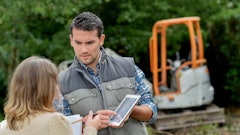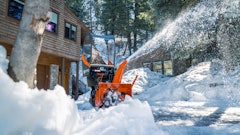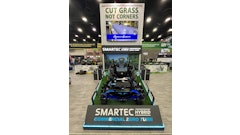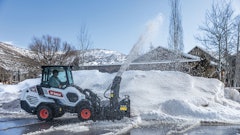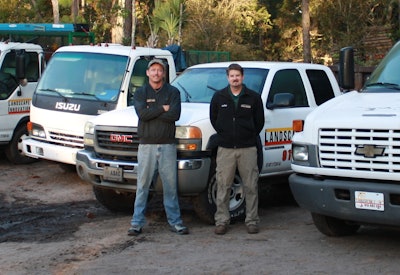
Some landscape contractors once had different career aspirations. But for one reason or another, they wound up owning/operating their own landscaping or lawn care business. Then there are guys like Josh Bishop. "If it weren't for the horticulture industry, I don't even know what I'd want to try doing," he relates.
What Bishop is doing these days is presiding over his own mid-size, seven-year-old, full-service landscaping company in Kingsland, GA, just across the Florida border roughly 35 miles north of Jacksonville. No. 4 on the 2014 Landscape Industry Hidden Gems list, Landscape Innovations employs roughly 13 year-round employees along with a couple seasonal workers. They offer a host of services, including installation and hardscaping, mowing and maintenance, tree care, fertilizing and weed control, aerating and turf renovation, pest control, drainage systems and brush hogging.
"We got pulled into a lot of these services by our clients," Bishop says. In some instances, he told clients "yes", pursued the necessary training, certification and/or subcontractors, and then added the services. In most instances, though, Bishop already had plenty of know-how to provide the services himself. "I attended Abraham Baldwin Agricultural College here in Georgia and earned an associate's degree in landscape design and grounds management. Then I took a job with TruGreen Landcare near Atlanta, GA. That was a good experience. They provided really good training. I learned about managing huge commercial sites, enhancements and irrigation."
TruGreen Landcare eventually transferred Bishop to Raleigh, NC. After about four years, Bishop decided it was time to start his own landscaping company—and the best place to do that would be back home in Camden County, GA. Bishop's wife looked for transfer opportunities with her employer, and the young couple was surprised to learn of an opening not far from home on St. Simons Island, GA. The timing was right to move back home.
"I always knew I wanted to have my own company one day," Bishop tells. "My wife's mom manages rental property in Camden County. So at first I spent a lot of time cleaning up rental properties. I used my personal truck and a beat-up trailer I bought from TruGreen and rebuilt. And I had my 48-inch walk-behind mower. That's how I got started."
Bishop's horticultural roots go back even further than this. He worked at a Walmart garden center in high school. He has just always had a keen interest in plants and landscaping.
Have to grow, can't say "no"
Maintaining some of his mother-in-law's rental properties got Bishop his start. His next big break was pretty unique, to say the least.
"One of the first things I noticed when I started my company was that many of my competitors didn't have their logos on their trucks," Bishop says. "So I did that right away; I went to a local company and had my logo put on the side of my truck and also the tailgate. I'm driving down the interstate one day and this guy is right on me. I'm getting a little aggravated. I take my exit and he follows right behind me, right on my tail."
At that point, Bishop is thinking he's going to end up throwing hands with this road rager, even though he has absolutely no idea what the guy could possibly be upset about. The guy wasn't upset, though. He was just looking for a reliable landscaper.
"Next thing I know, my phone rings," Bishop continues. "So I pull into a parking lot to answer it, and the guy keeps following behind me. He's the one calling me. He says he's been on my tail to try and get the phone number off of my truck. He's in the process of building a few new hotels in the area and needs someone to put in the landscaping."
It was a tremendous opportunity, for sure. But Bishop had a small problem: He had no labor force. So he talked to a few agents in his mother-in-law's real estate office to find out whose kids and other acquaintances might be looking for work.
"Me and a couple high school kids ended up putting in the landscaping for a big hotel, and wound up getting the maintenance contract after that," Bishop says. The other two hotels soon followed. Bishop Landscaping, dba Landscape Innovations, was off and running.
The company has since developed a diverse service and customer mix. Maintenance-related work accounts for about 60% of sales with installations, hardscaping and irrigation making up the other 40%. Additionally, revenue from residential vs. commercial clients is pretty much split down the middle.
Landscape Innovations took a somewhat different path than many landscape companies in that commercial business came before residential. "Right when I started my business, I joined the local Chamber of Commerce," Bishop says. "I started meeting and talking with hotel managers, local businesses, and people like that. Once we started doing maintenance for several of these types of clients, they told their friends and neighbors about us, and we started getting calls from homeowners. So our residential business just started to evolve on its own."
Landscape Innovations also started doing a decent amount of landscaping work for a couple area homebuilders. This soon presented a catch 22, which has led Bishop to begin seriously reconsidering this type of work. "These big construction jobs can be nice because you get a huge influx of cash," he explains. "But you also have a huge influx going out on the front end. And it can take a long time to get paid. I would just much rather take care of our businesses and other commercial clients, along with our homeowner customers. This focus also helps us manage our overhead and labor force a lot easier."
Back to their roots
Bishop says he does want to maintain a diverse service and client portfolio, but also wants to get "back to his roots" and focus more on commercial maintenance again. He has already let the homebuilders know that he'll be backing off this type of work. He hasn't run a Yellow Pages ad for years; doing so just resulted in countless calls from curious homeowners looking for free estimates and/or designs that they'd later use to install their own landscaping.
"We're now focusing more on homeowner associations and office complexes," Bishop says. "Our commercial accounts are the type that care about how their landscaping looks. And as long as it looks good, they don't worry about how it happens. Residential can be a lot different. Homeowners watch you more and question you more."
Homeowners can also make a landscape contractor's job a lot harder, such as when mowing the grass too short, or irrigating too much or at the wrong times. That's why Bishop prefers clients that allow his company to do everything. Practicing proper cultural practices is a big part of Bishop's message to clients.
"We now stipulate in our contracts that we should have sole control over the irrigation, fertilizer and pesticide applications, and obviously the mowing," Bishop says. "Sometimes clients will ask us to drop the mower deck because we're having to mow every week. It's about education—letting them know what the right approach is and how we do it."
Not every client is a full-service client with that stipulation in the contract, Bishop points out. But those who do sign on get a 10% discount on the fertilization and pest control. Having a crew on site every week helps Landscape Innovations be more proactive in controlling the potential problem. More customers are opting for this full-service program. Bishop has reconfigured his crews accordingly.
"We're adding a third maintenance crew this spring," Bishop says. "We've already hired the foreman and are training him on the accounts, our standards, etc. He'll be running a two-man crew. You see, we will no longer be offering bi-weekly maintenance services, and already started alerting customers back in December. It's just hard to make money doing that. So now we'll have a two-man crew service all of our residential customers, which are more spread out, so we'll have two guys sitting in a truck driving to jobs rather than three guys.
"Then we'll have two 3-man crews," Bishop continues. "One will focus on nothing but commercial, and will have the 60-inch zero-turn and other heavy equipment to do larger properties. The other three-man crew will focus on larger residential and small commercial. So we're gearing everything toward what we want to focus on, slowly weeding out the bi-weekly accounts. We really want to focus on our full-service accounts."
The next seven years
Other contractors have asked Bishop what it is like to provide such a wide array of services—all in-house. "I have to be honest, it can get really cumbersome at times," Bishop says. "But it's what our clients like, and it separates us from so many competitors who only offer a handful of services. So many clients tell us they really value being able to look to one company that can handle it all."
Perhaps a bigger challenge than offering so many services is finding good employees to help provide them. "A big thing we've pushed for the past three years is interns," Bishop says. "I contacted my old college professors to let them know what we're doing. We also talk to our vendors regularly when we are looking for employees."
Two employees Bishop hopes to have join him someday are his sons Hayden (4) and Garrett (1). That's obviously going to be a long way off, yet. "If not, so be it," Bishop adds. "But I really think they'll love it as much as I do."


![Gravely Pro Turn Mach One My23 Dsc03139 Edit 1200x800 5b2df79[1]](https://img.greenindustrypros.com/mindful/acbm/workspaces/default/uploads/2025/10/gravely-pro-turn-mach-one-my23-dsc03139-edit-1200x800-5b2df791.BucBnDoN22.jpg?auto=format%2Ccompress&fit=crop&h=100&q=70&w=100)



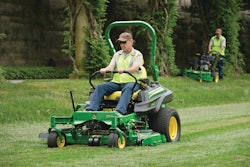

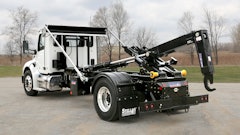
![Gravely Pro Turn Mach One My23 Dsc03139 Edit 1200x800 5b2df79[1]](https://img.greenindustrypros.com/mindful/acbm/workspaces/default/uploads/2025/10/gravely-pro-turn-mach-one-my23-dsc03139-edit-1200x800-5b2df791.BucBnDoN22.jpg?ar=16%3A9&auto=format%2Ccompress&fit=crop&h=135&q=70&w=240)
